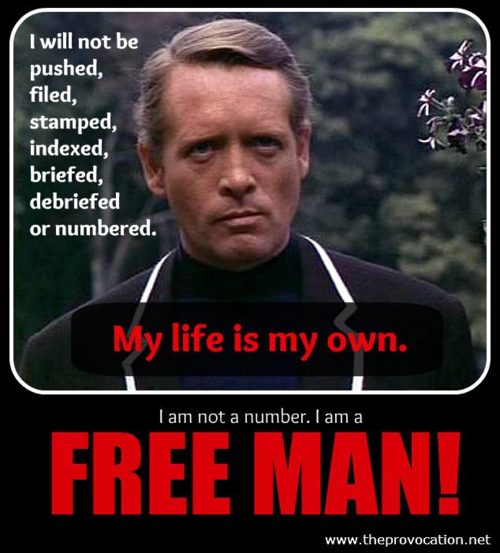How To Live the Good Life
All human beings want to live a good life and share it with their nearest and dearest. When life is difficult, it is easy to see what might make it better. If you are short of money, more money will make your life better. If you are being oppressed, life would be better if the oppression stopped.
But, when there is no obvious issue to be addressed, it is much harder to understand what would make your life better than it is now. It is at such times that the perennial question “What is it all about” wakes us up in the middle of the night.
Depending on our cultural context, we might just turn over and go back to sleep, go in search of “retail therapy”, visit the local neighbourhood guru, read some philosophy, try a different set of relationships, or re-visit the religious practices of our ancestors.
In our globalised world, the choice of options is vastly greater than it was only one or two generations ago. Since the 1960s, human communities which used to operate in splendid isolation from each other find themselves as next-door neighbours. This is an unprecedented and somewhat uncomfortable experience. Some people cope by retreating into their cultural ghettos, while others bend over backwards to be “politically correct” and try not to upset anyone else. But well-meaning efforts to avoid conflict can easily be interpreted as patronising and trigger anger and resentment.
But well-meaning efforts to avoid conflict can easily be interpreted as patronising and trigger anger and resentment.
 These issues are so complex that it is tempting to throw up our hands in horror and avoid them. But there is a more constructive approach we could take? Is there any knowledge available that we are not applying to improve our prospects?
These issues are so complex that it is tempting to throw up our hands in horror and avoid them. But there is a more constructive approach we could take? Is there any knowledge available that we are not applying to improve our prospects?
Table of Contents
What We Know About Social Psychology
Since the 1950s, an enormous amount of research has been done on how our individual thinking is influenced by our cultural environment. This has been published in “pop psychology” books which many of us have read. The experts all agree on the following:
- Individual perception is very unreliable. For example, most eye-witness testimony to unexpected events is so inaccurate as to be worthless.
- Even when our individual perception is accurate, it can be overridden by the pressure to conform to the beliefs of those around us.
- Many of us will obey an authority figure, even when we know that doing so will lead to someone else suffering.
- Even when we know what we ought to do, we struggle to actually do it.
Western civilisation is proud of its Enlightenment Values of free enquiry, individual rights and forward-looking progress, and those of us who grew up in it are trained to believe that we are capable of freely making choices in our own “rational self interest”. Somehow, we believe in these values, even while all the evidence shows that we don’t really live in accordance with them. If we did, it is hard to see how the billions of dollars devoted to manipulating our choices could be justified.
Can we do better than this? Is it possible to become the freely-willing, clear-thinking human beings we claim to be?
We would not be writing this if we did not believe that this is not only possible, but that there are practical means which any of us can apply to live our lives in a more “real” way than we customarily do. This is not an invitation to join The Third System cult, since there isn’t one. We are not offering a panacea for all ills, but we do think that applying a little knowledge and learning some simple skills can help us become more fully human.
If you feel offended at the suggestion that you are not already a free person, capable of making up your own mind and pursuing your chosen path in life, then this message is not addressed to you, and we recommend that you read no further.You obviously do not need what we are offering, and we wish you the best of luck in your endeavours.
The Moral Modalities Framework
We invite those of you who are still reading to take a look at this diagram:
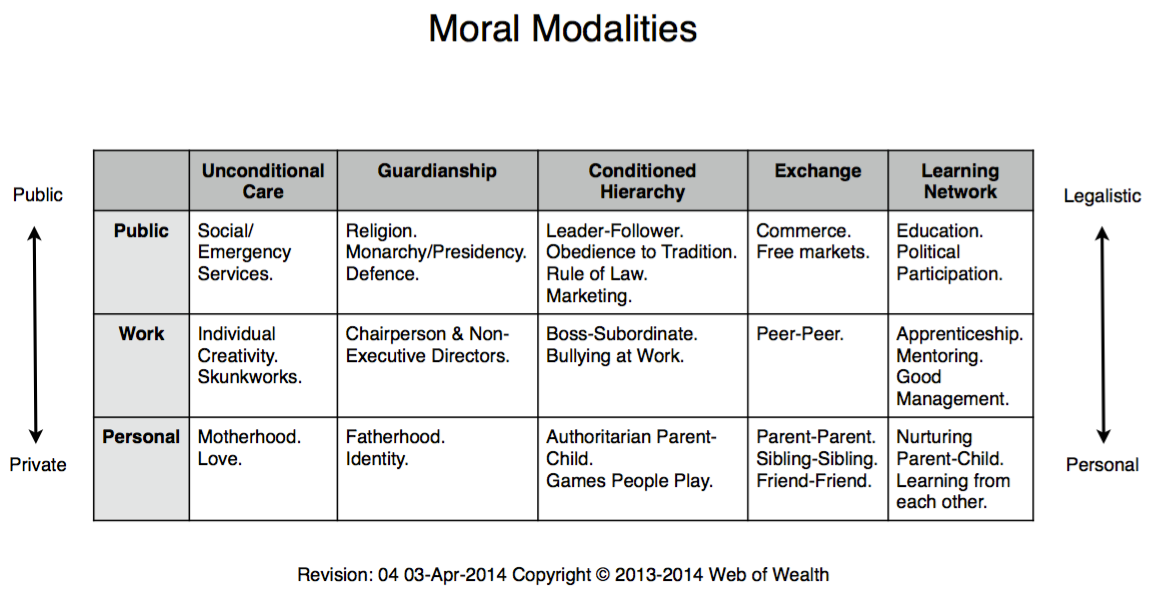
The diagram shows rows which represent different levels of engagement with other people, from the personal in the bottom row through life at work in the middle, to public engagement at the top. The columns represent different kinds of engagement, which we refer to as Moral Modalities.
Put very simply, we contend that there are five different modalities of engagement with other people that we all participate in, and that we are living the good life if we are capable of understanding the difference between these and have the skills to know which we are operating in at any time and how to conduct ourselves properly in each of them.
If we confuse these modalities, or try to operate any of them as though we are in a different one, our lives go badly wrong.
Different social groups, at different stages of their evolution, specialise in different cells in the diagram, but a lack of balance will eventually lead to their failure to adapt to changing circumstances, when the advantages they may have once had will pass to some other social group.
This is the major factor that drives the rise and fall of social groups, at levels ranging from the personal, to the world of wealth creation, to public life and upwards to the level of whole cultures.
Unconditional Care – the Foundation of Being Human
The Unconditional Care Modality underpins everything else in human life.
The archetypal symbol of this is a mother breast-feeding a baby.
In this modality, we recognise something that needs to be done and act without consideration for whether we will be rewarded or punished for it. We can see that it needs to be done, so we do it.
At the personal level, this expresses itself in caring for those we love. We do not do so for what we can get out of it, we do it because that is what it means to be human.
In the world of work, this expresses itself as creativity. Most creativity takes place inside individual minds, but there is a form of social organisation that can scale this up without losing the creative spark. We call this Skunkworks. We will explore this in later posts.
Guardianship – Deciding Who We are
The Guardianship Modality is about establishing the boundaries around the social group. Who is inside and who is outside? The archetype of this is the stern father, who disciplines the members of the group and ensures that they live up to the values that make the group who they are.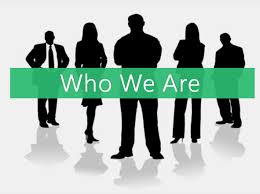
At the level of work in a typical Western-style environment this is the job of the Chairman and Non-Executive Directors, or the founding entrepreneur.
At the level of public life, this guarding of identity is in the hands of priesthoods, monarchs or presidents and the defenders of the realm.
Conditioned Hierarchy – Keep on Keeping On
In the Conditioned Hierarchy Modality, we are going about ordinary life, mostly without reflecting on what is happening. We get up when the alarm goes off, walk the dog, commute to work, do what we need to do, come home to the family, get the kids to do their homework, watch the TV, and check in on Facebook.
We are following our training, operating almost on auto-pilot.
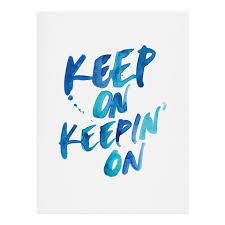 Conditioned Hierarchies have fixed value systems. If we stray from the path, we feel guilt or shame. There are leaders and followers. There is a hierarchy of prestige, with reassuring authority figures who will guide us and keep us safe. There are accepted assumptions that must not be challenged.
Conditioned Hierarchies have fixed value systems. If we stray from the path, we feel guilt or shame. There are leaders and followers. There is a hierarchy of prestige, with reassuring authority figures who will guide us and keep us safe. There are accepted assumptions that must not be challenged.
There is also competition. If we work for General Motors, we know that Ford is the enemy. If we follow the Manchester United soccer team, we know that Liverpool is the traditional foe. We get immense pleasure out of belonging to our side and the competition with the “enemy” is a great source of emotional stimulus for all participants.
In the field of commerce, the dark arts of marketing are used to make sure we keep buying the right brand. After all Coca-Cola is “The Real Thing”, isn’t it? When marketing works, buying the product is a “no-brainer”.
Conditioned Hierarchies are a powerful way to “deliver the goods”, as long as the environment doesn’t change. But when it does, they can become dangerous. When the environment changes, it is likely that nobody in the Conditioned Hierarchy will realise this. When things start to go wrong, they will assume that this is because people are not working hard enough. The authority figures will “crack the whip” and demand more obedience, often continuing to do so until the organisation collapses.
Exchange – Let’s Make a Deal
In the Exchange Modality, I have something that you want, you have something that I want, and we figure out a deal to exchange one for the other. This is the world of “free market economics”, although free markets are less common than most of us imagine.
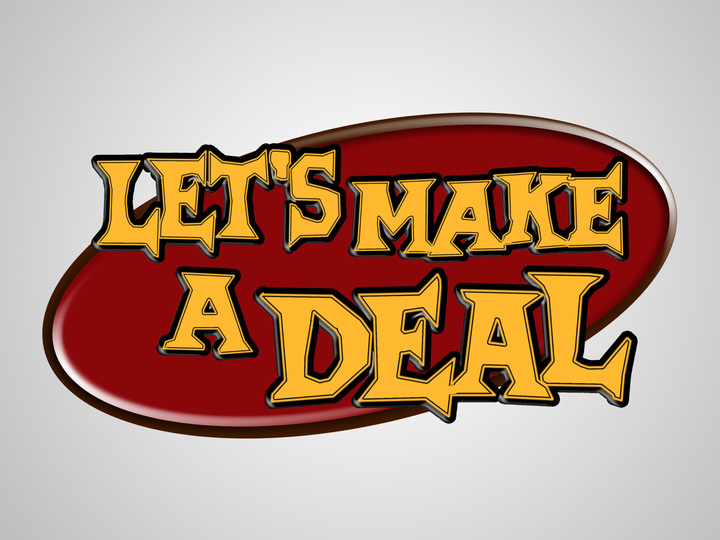 The modern world since the eighteenth century has grown out of an emphasis on the combination of Conditioned Hierarchies and Exchange. Adam Smith, who is credited with being the founder of free market economics, described a pin factory, which increases productivity by division of labour (a classic Conditioned Hierarchy), and producers competing in a free market (Exchange), as examples of how a free market economy creates increasing wealth.
The modern world since the eighteenth century has grown out of an emphasis on the combination of Conditioned Hierarchies and Exchange. Adam Smith, who is credited with being the founder of free market economics, described a pin factory, which increases productivity by division of labour (a classic Conditioned Hierarchy), and producers competing in a free market (Exchange), as examples of how a free market economy creates increasing wealth.
Learning Network – The Organ of Evolution
The Learning Network Modality is subtle, but important. In this modality, people learn from each other without any assumptions of higher or lower prestige. Authority flows according to who at any moment knows more than anybody else. Those who wish to learn have to be prepared to subordinate themselves to whoever is teaching them, but success in the interchange abolishes the authority hierarchy, because the participants become peers in that particular aspect of knowledge.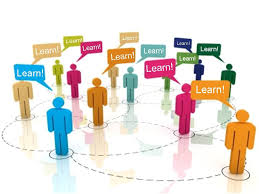
Learning Networks enable new knowledge to be developed and distributed throughout a social group, enabling them to evolve and adapt to changing circumstances.
Historically, these are vitally important, but they are also poorly documented and hard to see, because they tend to dissolve, once a new level of learning has been reached, and get replaced with a Conditioned Hierarchy, which then takes the credit for what happened.
Applying the Framework
Anybody can apply the above framework to examining what is going on around them. To help you to “get the hang of this”, we will be writing posts that apply the framework to understanding contemporary events, and also to understanding how we arrived at the modern world that we live in. We call this The Third System Research Programme.
Subjects we will cover include:
- The evolution of civilisation over the last five thousand years.
- How science works – its strengths and its weaknesses.
- When things go wrong – monstrous moral hybrids.
- Practical methods for applying Moral Modalities to our lives.

